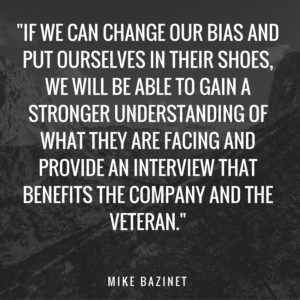Member Mike Bazinet, Associate Director of Plasma Recruitment at Grifols Inc. is authoring a series of guest posts on how employers can be more effective with their veteran recruitment, outreach and retention efforts. Be sure to read Mike’s previous post, “Stories – The Common Bond Between All Veterans.”
How many times have we all heard that we should tailor our resume to a certain position? If that is the advice we give candidates prior to their interview, should we not take the same tactic and tailor our interview to the candidates sitting in front of us? As recruiters, we probably have interviewed hundreds of candidates. I think many of us can say that most of them were civilian candidates, ranging from their early twenties to later years. Would you approach a college graduate the same way you would approach a seasoned employee with 20 or more years of experience? The same question could be asked of interviews between civilians and the military veteran. They are going through a life-changing event, the fear of the unknown is upon them and they need our assistance. Understanding the military candidate is critical to our success in hiring veterans but before we can do that, we need a basic understanding of the veteran.

Over time, I have heard that the military candidates must translate their military career to Corporate America. I have a question for all of you. How can a military veteran translate their career and lifestyle to Corporate America if they never have been in Corporate America? I joined the service when I was 18 years old and retired at 39, for 21 years all I knew was what it was like to be in the service. As we approach the military interview, we need to think of what is happening in their life at this particular time. They are not going to understand your world; all they see is uncertainty at this juncture of their life. They are going through a life-changing event that may be hard for someone that has never served to understand.
As recruiters, we must remember that the veteran sitting in front of you is filled with anxiety. What a civilian takes for granted is many times nerve-racking for a veteran. Recently, I hired a few military veterans and I asked them to tell me some things that made them nervous about stepping away from the service, what caused some of their anxiety. The main theme of their anxiety was the fear of the unknown. They stated their whole life was changing, that it was not just a change in jobs; their entire lifestyle was being turned upside down. One day they knew everything they needed to know, the very next day they were lost if a world of uncertainty. Think what it would be like for you to move to a foreign country, not having a clue how to communicate, not understanding the customs, not knowing where to go to get assistance, simply left to fend for yourself. Would you have anxiety? This is what our veterans are facing when they step away from the service.
Civilian life is different for the veteran, as recruiters we must remember we will never truly understand the veteran but if we take off our blinders, we may get closer view of the anxieties they are facing. If we can change our bias and put ourselves in their shoes, we will be able to gain a stronger understanding of what they are facing and therefore provide an interview that benefits the company and the veteran. Our veterans put our safety first and guided us through some tough times while they served in the military; it is time for all of us to guide them through their anxieties and the fear of the unknown. Make it a good day and HIRE a vet!
Mike Bazinet is the Associate Director of Plasma Recruitment with Grifols Inc., a global healthcare company that creates 53 annual affirmative action plans. During a 20-year career in the United States Air Force, he recruited pilots, navigators, engineers, medical doctors, nurses and pharmacists. As a civilian, he worked for Orion International, a recruitment organization specializing in assisting retiring and separating veterans to gain access to positions within Corporate America. He was also instrumental in creating and launching the Orion International Health Professions division. In 2008, Mike took a recruiting position at Grifols and was quickly promoted to Supervisor of Recruitment in 2009, then Manager of Recruitment in 2011. In 2014, his team achieved a milestone year, hiring over 3,400 new employees. His team surpassed that milestone in 2015 and hired a total of 3,700 employees into the Grifols family. In his current role as Associate Director of Staffing, Mike has control of the strategic development and process of the recruitment efforts within Grifols Plasma Organization. Since being at Grifols Mike has been directly involved with the affirmative action program at Grifols and has played an integral part in the training and execution of the overall program at Grifols.


